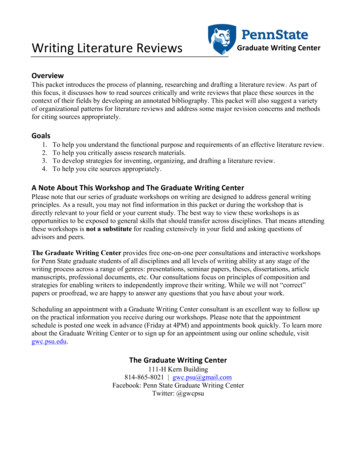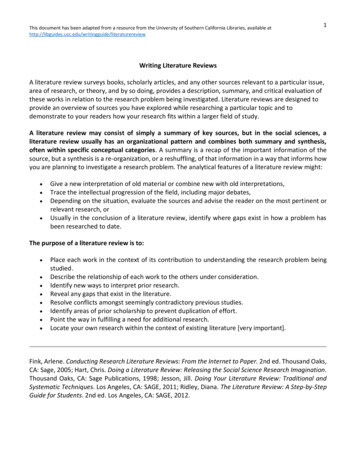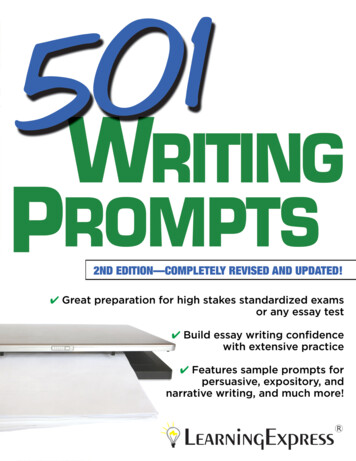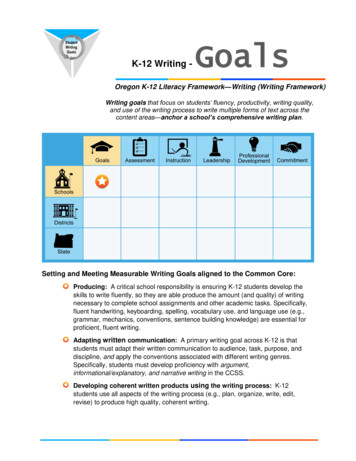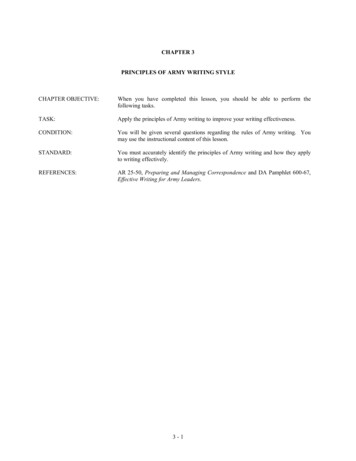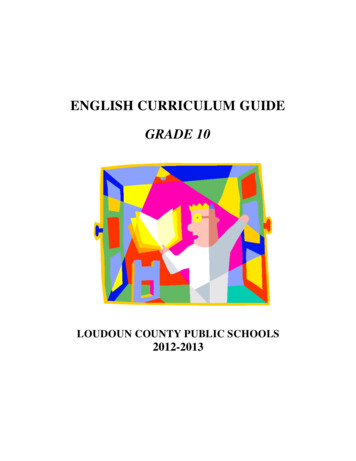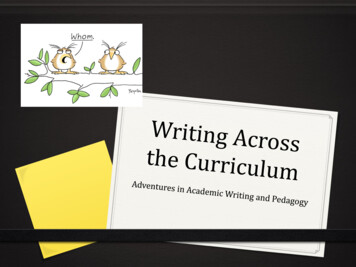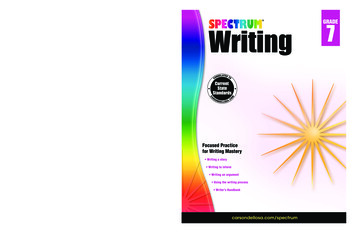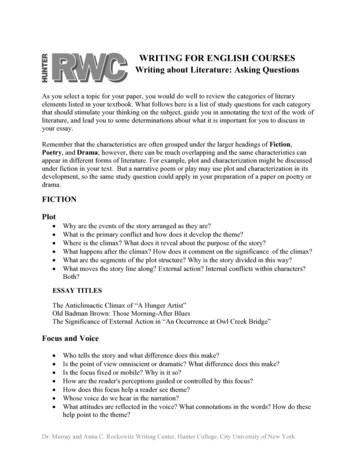
Transcription
WRITING FOR ENGLISH COURSESWriting about Literature: Asking QuestionsAs you select a topic for your paper, you would do well to review the categories of literaryelements listed in your textbook. What follows here is a list of study questions for each categorythat should stimulate your thinking on the subject, guide you in annotating the text of the work ofliterature, and lead you to some determinations about what it is important for you to discuss inyour essay.Remember that the characteristics are often grouped under the larger headings of Fiction,Poetry, and Drama; however, there can be much overlapping and the same characteristics canappear in different forms of literature. For example, plot and characterization might be discussedunder fiction in your text. But a narrative poem or play may use plot and characterization in itsdevelopment, so the same study question could apply in your preparation of a paper on poetry ordrama.FICTIONPlot Why are the events of the story arranged as they are?What is the primary conflict and how does it develop the theme?Where is the climax? What does it reveal about the purpose of the story?What happens after the climax? How does it comment on the significance of the climax?What are the segments of the plot structure? Why is the story divided in this way?What moves the story line along? External action? Internal conflicts within characters?Both?ESSAY TITLESThe Anticlimactic Climax of “A Hunger Artist”Old Badman Brown: Those Morning-After BluesThe Significance of External Action in “An Occurrence at Owl Creek Bridge”Focus and Voice Who tells the story and what difference does this make?Is the point of view omniscient or dramatic? What difference does this make?Is the focus fixed or mobile? Why is it so?How are the reader's perceptions guided or controlled by this focus?How does this focus help a reader see theme?Whose voice do we hear in the narration?What attitudes are reflected in the voice? What connotations in the words? How do thesehelp point to the theme?Dr. Murray and Anna C. Rockowitz Writing Center, Hunter College, City University of New York
ESSAY TITLESA Touch of Class: The Narrator in “Our Friend Judith”Growing Up Female: A Look at Voice in “Boys and Girls”Characterization Who is the main character?What is he like, and how do we learn what he is like?How do his actions and conflicts reflect the theme?Does he learn anything important in the course of the story or not? How does that reflectthe theme? Why are the other characters there? How do they contribute to plot? to theme? to theconflict of the main character? Are the characters round? flat? stereotypes? Why would the author develop them so? How is the main character presented? How does he dress? What are his surroundingslike?ESSAY TITLESBack in the Saddle Again: Motivation in “The Rocking Horse Winner”The Presentation of Mangan's Sister in James Joyce’s “Araby”The Narrator as Character in “The Celebrated Jumping Frog of Calaveras Country”Symbols What in the story is symbolic?How do you know that it is a symbol?What is its meaning?At what points in the plot does the symbol appear?How often does it appear?How would the story be different if the symbol were not there?Is the symbol an archetype?ESSAY TITLESSymbolism in “The Lottery”: An Analysis of the Description of the Lottery BoxName Symbolism in “Young Goodman Brown”Dr. Murray and Anna C. Rockowitz Writing Center, Hunter College, City University of New York
POETRYSpeaker Who is the speaker in the poem? Is there more than one speaker? If so, what is theirrelationship to each other? What facts do you have about the speaker's situation? What is the speaker's tone of voice and attitude toward the subject matter? What does the speaker's tone suggest about his character and personality? How would the poem be different with another speaker?ESSAY TITLESHis Lady's Response in “Dover Beach”The Emotional State of the Speaker in “Stopping by Woods on a Snowy Evening”: TwoInterpretationsTone in Dorothy Parker's “Comment”The Evolving Attitude of the Speaker in “Fern Hill”Situation and Setting What exactly is going on in the poem?Who is involved? Where? When? Why?What do you know about where things take place?What descriptive details are used to establish setting?What is significant about the descriptive detail? Is it suggestive? Of what?How would it affect the poem if the setting were different?ESSAY TITLESSetting as the Trigger of Poetic Impulse in “Among School Children”The Ritual of the Wake in “After Great Pain”First Impressions: A Study of Setting in the Opening of “The Love Song of J. AlfredPrufrock”Words Is there ambiguity in any of the words? Do any have double meanings?What is the effect of the ambiguity on the meaning of the poem?Do any words have significant connotations?Are there patterns in the words? Do various words have similarconnotations? Do various words seem selected to create the same impact?Dr. Murray and Anna C. Rockowitz Writing Center, Hunter College, City University of New York
ESSAY TITLESThe Harvest of Words: An Analysis of Language in “To Autumn”Religious Connotations in “Spring and Fall”Figurative Language How do metaphors and similes in the poem sharpen the images? Are there connotations suggested in these comparisons? If there is personification, why would the poet choose to use it? How does it affect orinfluence the reader's perception of the poem? If there is a symbol, what kind is it? A symbolic thing? action? event? How do you know it is a symbol? How is it used in the poem? What is its significance? How does it add meaning to the poem?ESSAY TITLESMetaphor in “The Brain Is Wider than the Sky”Symbolism in “When Lilacs Last in the Dooryard Bloomed”Sound and Sight Are there repetitions of sound that form a significant pattern?What is the effect of the rhythm? Is it slow and mournful? quick and happy?How does the rhythm complement the poem’s meaning?What is the effect of the sound of individual words or a series of words? Is the sound softand melodic? Is it harsh and abrasive?What is the relationship between the sound of the words and the meaning of the poem?Are there any significant visual features in the poem?How do they affect the reader?How do they complement the poem's meaning?ESSAY TITLESPacing in “The Second Coming”Sound in "Kubla Khan": The Sacred River of WordsDr. Murray and Anna C. Rockowitz Writing Center, Hunter College, City University of New York
Stanza and Verse Form What is the stanza form of the poem? the verse form? Do they follow a traditional pattern or are they the inventions of the poet? How do these forms enhance the effect of the poetry?ESSAY TITLESCreative Verse Form in "Chanson Innocente”Sonnet Form in Shakespeare's "Winter" and "Spring": A Study in ConsistencyDRAMADramatic Structure and the Stage What is the climax of the play? Where does the action break into the five structural parts: exposition, rising action,climax, falling action, catastrophe? For what kind of stage does the play seem intended? How would the staging affect theplay's visual impact on the audience?ESSAY TITLESThe Play behind the Play: A Rationale for the Off-Stage Action in Hedda GablerThe Ritual of Plot in Long Day’s Journey into NightStaging The TempestTragedy, Comedy, and the Modern Drama How are the values and principles of the characters demonstrated in the play? Where dothey come from? Are they universal, as in tragedy? societal, as in comedy? or morepersonal, as in modern drama? How are these values involved in the dilemma of the central character or characters? How many central characters are there? Is there a single tragic hero? a multitude of comiccharacters? a core of central modern characters? What difference does this make in thefocus, purpose, and impact of the play? How does the play end? With tragic enlightenment? With comic conformity to socialroles? Or with a more complex modern situation that must be analyzed on its own terms?ESSAY TITLESThe Impossibility of Being Ernest: Jack Worthing as Comic CharacterThe Predictability of Ending in HamletDr. Murray and Anna C. Rockowitz Writing Center, Hunter College, City University of New York
The Ritual of Plot in Long Day's Journey into Night Staging The Tempest Tragedy, Comedy, and the Modern Drama !How are the values and principles of the characters demonstrated in the play? Where do they come from? Are they universal, as in tragedy? societal, as in comedy? or more personal, as in modern drama?
